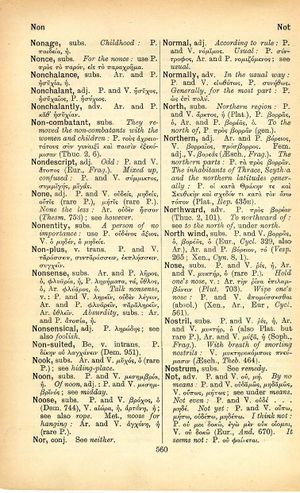not: Difference between revisions
κράτιστοι δ᾽ ἂν τὴν ψυχὴν δικαίως κριθεῖεν οἱ τά τε δεινὰ καὶ ἡδέα σαφέστατα γιγνώσκοντες καὶ διὰ ταῦτα μὴ ἀποτρεπόμενοι ἐκ τῶν κινδύνων → the bravest are surely those who have the clearest vision of what is before them, glory and danger alike, and yet notwithstanding, go out to meet it | and they are most rightly reputed valiant who, though they perfectly apprehend both what is dangerous and what is easy, are never the more thereby diverted from adventuring
(CSV4) |
(de4_3) |
||
| Line 7: | Line 7: | ||
<b class="b2">I think not</b>: P. οὐ μοι δοκῶ, ἐγὼ μὲν οὐκ [[οἴομαι]], V. οὐ δοκῶ (Eur., ''And.'' 670). | <b class="b2">I think not</b>: P. οὐ μοι δοκῶ, ἐγὼ μὲν οὐκ [[οἴομαι]], V. οὐ δοκῶ (Eur., ''And.'' 670). | ||
<b class="b2">It seems not</b>: P. οὐ φαίνεται. | <b class="b2">It seems not</b>: P. οὐ φαίνεται. | ||
}} | |||
{{GermanLatin | |||
|dela=not, Adv., s. [[nötig]]. | |||
}} | }} | ||
Revision as of 09:45, 15 August 2017
English > Greek (Woodhouse)
adv.
P. and V. οὐ, μή. By no means: P. and V. οὐδαμῶς, μηδαμώς, V. οὔπως, μήπως; see under means. Not even: P. and V. οὐδέ . . . μηδέ. Not yet: P. and V. οὔπω, μήπω, οὐδέπω, μηδέπω. I think not: P. οὐ μοι δοκῶ, ἐγὼ μὲν οὐκ οἴομαι, V. οὐ δοκῶ (Eur., And. 670). It seems not: P. οὐ φαίνεται.
German > Latin
not, Adv., s. nötig.

